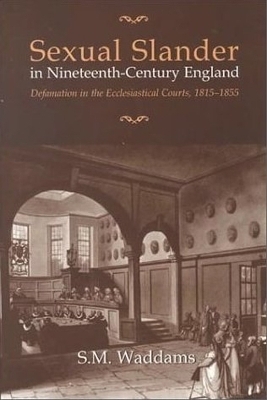
Sexual Slander in Nineteenth-Century England
Defamation in The Ecclesiastical Courts, 1815-1855
Seiten
2000
University of Toronto Press (Verlag)
978-0-8020-4750-2 (ISBN)
University of Toronto Press (Verlag)
978-0-8020-4750-2 (ISBN)
- Titel z.Zt. nicht lieferbar
- Versandkostenfrei
- Auch auf Rechnung
- Artikel merken
Until 1855, slanderous language was punishable in Britain's ecclesiastical courts. Waddams shows how the law worked not only in theory but in practice. The evidence of the witnesses supplies fascinating details of day-to-day events.
'You are a nasty bloody thundering whore,' one Gloucester woman said to another in 1852. Most lawyers and historians are surprised to learn that until 1855 language of this sort was punishable in the ecclesiastical courts.
In a study based on court records and lawyers' correspondence, Stephen Waddams shows how the law worked not only in theory but in practice. He concludes that, though this branch of the law had many deficiencies, it also had certain merits, especially from the point of view of women, who constituted 90 per cent of all complainants. The evidence of the witnesses supplies fascinating details of day-to-day events and of social attitudes from the words of participants, who were mostly of a very modest social status, and not accustomed to recording their views. Their evidence provides a valuable perspective not generally available to historians.
The study is of importance to legal historians and to all who have an interest in nineteenth-century England, especially to those concerned with the sexual reputation of women.
'You are a nasty bloody thundering whore,' one Gloucester woman said to another in 1852. Most lawyers and historians are surprised to learn that until 1855 language of this sort was punishable in the ecclesiastical courts.
In a study based on court records and lawyers' correspondence, Stephen Waddams shows how the law worked not only in theory but in practice. He concludes that, though this branch of the law had many deficiencies, it also had certain merits, especially from the point of view of women, who constituted 90 per cent of all complainants. The evidence of the witnesses supplies fascinating details of day-to-day events and of social attitudes from the words of participants, who were mostly of a very modest social status, and not accustomed to recording their views. Their evidence provides a valuable perspective not generally available to historians.
The study is of importance to legal historians and to all who have an interest in nineteenth-century England, especially to those concerned with the sexual reputation of women.
Steven Waddams is a professor of law at the University of Toronto.
| Erscheint lt. Verlag | 13.6.2000 |
|---|---|
| Verlagsort | Toronto |
| Sprache | englisch |
| Maße | 160 x 235 mm |
| Gewicht | 674 g |
| Themenwelt | Geschichte ► Teilgebiete der Geschichte ► Kulturgeschichte |
| Religion / Theologie ► Christentum ► Kirchengeschichte | |
| Recht / Steuern ► Allgemeines / Lexika | |
| Recht / Steuern ► EU / Internationales Recht | |
| Recht / Steuern ► Öffentliches Recht ► Kirchenrecht | |
| ISBN-10 | 0-8020-4750-5 / 0802047505 |
| ISBN-13 | 978-0-8020-4750-2 / 9780802047502 |
| Zustand | Neuware |
| Informationen gemäß Produktsicherheitsverordnung (GPSR) | |
| Haben Sie eine Frage zum Produkt? |
Mehr entdecken
aus dem Bereich
aus dem Bereich
der stille Abschied vom bäuerlichen Leben in Deutschland
Buch | Hardcover (2023)
C.H.Beck (Verlag)
CHF 32,15
vom Mittelalter bis zur Gegenwart
Buch | Softcover (2024)
C.H.Beck (Verlag)
CHF 16,80


